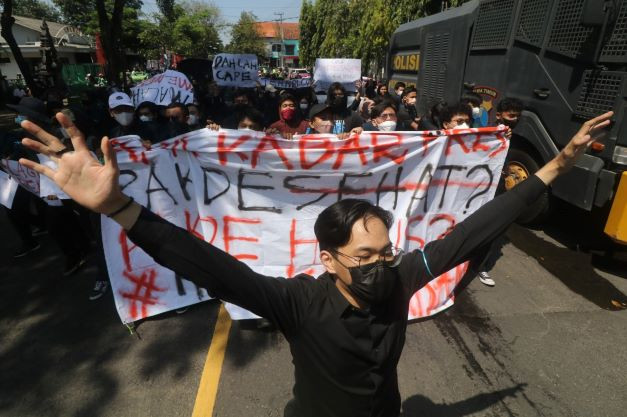Popular Reads
Top Results
Can't find what you're looking for?
View all search resultsPopular Reads
Top Results
Can't find what you're looking for?
View all search resultsWill Indonesia’s digital activism overrule its representative democracy?
One can easily claim to have internal data or big data of hundreds of millions of people supporting a policy or a decision. In reality, the 'support' may just consist of bots or people paid to write content and tweets.
Change text size
Gift Premium Articles
to Anyone
I
n a country where its people are outsiders, social media rules. The world has repeatedly seen how social media is able to generate social change. The world has also seen social media progress from being an organic space for people to voice their concerns to becoming one which is fabricated with buzzers to shape false information and generate false conclusions.
The term “no viral, no justice” is not new in Indonesia. The Manpower Ministry changed the pension plan policy after an outcry on social media and an online petition at Change.org supported by 400,000 netizens. The State-Owned Enterprises Ministry changed their paid vaccine policy after thousands of netizens shared their concerns on social media, especially Twitter. The police of east Luwu regency finally reopened a sexual assault case only after it started to gain attention on social media.
Given this new status quo, can we conclude that it is a good sign for Indonesian democracy, or rather a warning sign of a crumbling one? And will our clicktivism finally overrule our representative democracy?
Let us take a look first at how Indonesian democracy is, digitally. We are not yet talking about the metaverse, but rather: who are the digital population, how do they interact and what are the results of this digital democracy.
First, the digital population. While Indonesia is considered the country with one of the largest numbers of social media users in the world, the digital population does not represent the whole of the general population. Indonesians who are connected to the internet usually live in urban areas, leaving the voices of those living in rural areas unheard.
Second, the interaction. Most Indonesian public officials, including those in the legislative and executive branches of power, are now active on social media. They often open their space to connect to the people, taking in their concerns and sharing their achievements.
Third, the result. As stated above, there are often policy changes as a result of the interaction between Indonesian digital users and their political representatives. The results affect not only the national population, but can also impact local areas, which happens often in cities or even villages.
The explanation above seems to show how the digital space has helped Indonesian democracy flourish. If people can easily get access to policy making through the digital space, why bother having representative democracy, which for years has been considered corrupt and not representative?
There are indeed positive aspects to our digital society and clicktivism. However, we do have to concede that they are not our perfect knights in shining armor, here to save our regressing democracy.
The late Parahyangan University professor Bob Sugeng Hadiwinata once warned us and explained to us that we cannot keep on “sacralizing” civil society. He reminded us that while civil society has been pushing for more consolidation of Indonesian democracy, it has also been regressing it -- he called it the “uncivil society”. This can be applied in our digital society as well.
In our current status quo, the uncivil society is the internet buzzers and bots, and those who criminalize critics using the draconian Electronic Information and Transaction (ITE) Law.
Buzzers and bots disrupt the validity of internet content. One can easily claim to have internal data or big data of hundreds of million people supporting a policy or a decision. In reality, that “support” may merely be bots or people paid to write contents and tweets.
It can easily be verified, of course, since our technology is advanced enough to do so. But this shows how flexible and easily fabricated data in the digital space are.
The Indonesian digital space does not warrant people to freely express their ideas, concerns and grievances. The ITE Law, which has often been used to criminalize people who are protesting and contesting ideas and facts, hinders people from being enthusiastic and active in collaborating and taking part in democratic activities.
In addition, while it is corrupt and not ideally representative, our representative democracy is still the best way for us to ensure representation in the country. Thousands of Indonesians are still not connected to the internet. However, they can easily talk to the elected officials during their visits. It is not the perfect way, but it is the current best option.
The last important thing to note is that even if Indonesians have been screaming, crying and throwing perfect storms in the digital space -- still, not everything is heard. After all, the people who they are screaming to are the same persons who they deem as corrupt and not representative.
***
The writer is a campaigner at Change.org Indonesia. The views expressed are his own.










